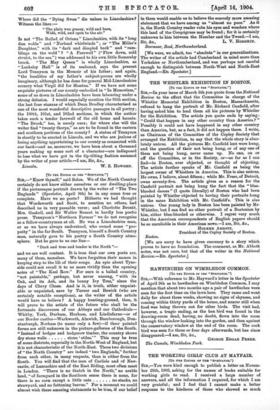and we are well content. It is tree that our
own poets are, many of them, nameless. We have forgotten their names in keeping step to the lilt of their songs. An epic, about Tyne- side could not recall it to us more vividly than the opening notes of "The Keel Row." For ours is a ballad country, "not paintable," perhaps, but never unsung, "with its Oak, and its Ash, and its bonny Ivy Tree," since the days of Chevy Chase. And is it, in truth, either unpaint- able or unpainted, save by Turner and Bewick (who are certainly notable exceptions), as the writer of the article would have us believe P A happy hunting-ground, then, it will prove to the artiste of the future who shall be the fortunate discoverers of our Abbeys and our Cathedrals— Whitby, York, Durham, Hexham, and Lindisfarne—or of our Border castles—Warkworth, Alnwick, Bamborougb, Dun- stanburgh, Norham (to name only a few)—if their painted forms are still unknown in the picture-galleries of the South. "Instead of hedges and hedgerow timber, the country shows
dry stone walls stone " This may be true of some districts, especially in the North-West of England, but it is not characteristic of the North-East. These two divisions of "the North Country" are indeed "two Englands," further from each other, in many respects, than is either from the South. You will find that the men of Carlisle and of New- castle, of Lancashire and of the East Riding, most often meet in London. "There is no thatch in the North," no arable land, "of farmyard in the Southern sense there is none, for there is no corn except a little oats no stacks, no stmwyard, and no fattening beeves." For a moment we could almost wish these arnasieg statements to be true, if our belief HAWFINCRBS ON WIMBLEDON COMMON.
pro TR. EorrOR Or T. "SPROTATOR..1 Sr,—With reference to Mr. Hayward's letter in the Spectator of April 9th as to hawfinches on Wimbledon Common, I may mention that about two months ago a pair of hawfuzches were seen for the first time on the lawn here. They came and went daily for about three weeks, showing no signs of shyness, and coming within thirty yards of the house, and nearer still when food was being thrown out for other birds. The visit had, however, a tragic ending, as the hen bird was found in the drawing-room dead, having, no doubt, flown into the room through the window looking into the garden, and then against the conservatory window at the end of the room. The cock bird was seen for three or four days afterwards but has since disappeared.—I am, Sir, &a,
The Camels, Wimbledon Park,
THE WORKING GIRLS' CLUB AT MAYFAIR. ITO TIM EDITOR Or TH2 “RPROTATOR."]
SIE,—Y011 were kind enough to publish a letter on Novem- ber 28th, 1903, asking for the names of books suitable for working girls to read. I received a large number of answers, and all the information I required, for which I am very grateful ; and I feel that I cannot make a better response to the kindness of those who showed so much






































 Previous page
Previous page